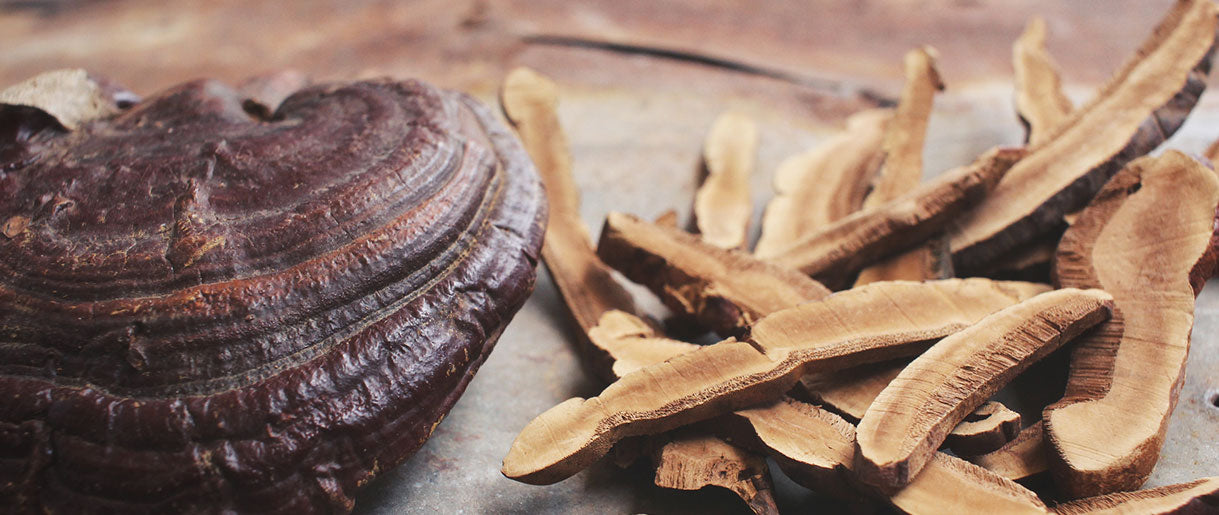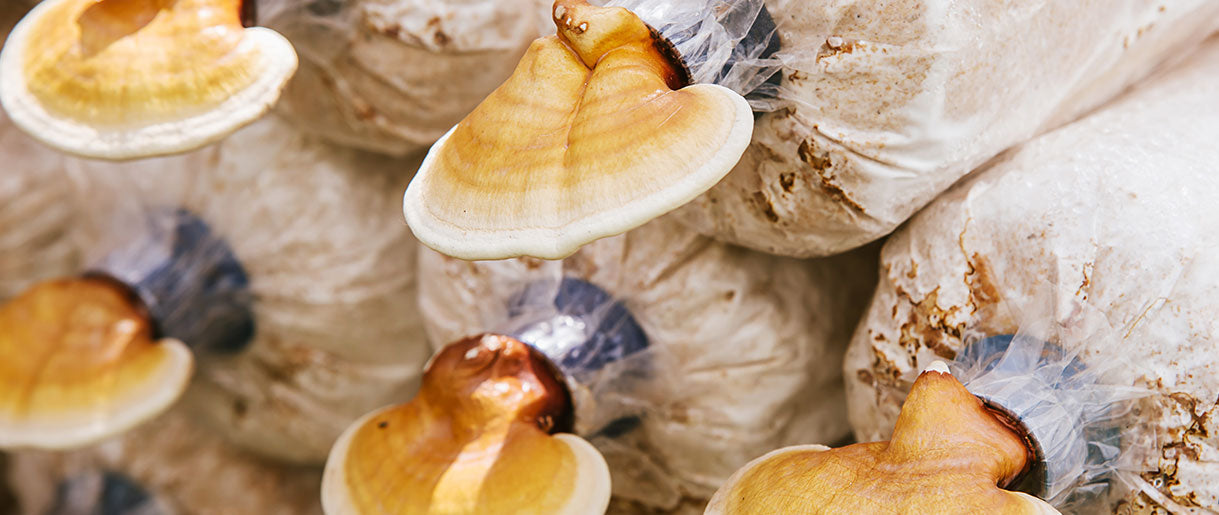Reishi mushroom, or Ganoderma lucidum, is a medicinal mushroom used in traditional Eastern medicine for centuries. Some preliminary research suggests that it may help manage symptoms of depression due to its potential neuroprotective and anti-inflammatory effects. The bioactive compounds in Reishi, like triterpenoids and polysaccharides, may promote brain health and modulate the body's stress response, possibly alleviating depressive symptoms.
In this article, we will delve into the potential of reishi mushroom as an adjunct treatment for depression. We will explore what Reishi is, the science behind its benefits for mental health, and how it might be incorporated into a holistic approach to managing depression.
It's important to remember that while natural remedies like reishi show promise, they should be used in conjunction with, and not as a substitute for, conventional treatment methods. Depression is a complex condition and often requires a multifaceted treatment approach, including therapy, medication, lifestyle changes, and sometimes, dietary supplements like Reishi. Please consult a healthcare provider for personalized advice before making significant changes to your treatment regimen.
Understanding Depression: More Than Just Feeling Blue

Depression is one of the most common mental health issues worldwide, affecting millions of people from all walks of life. It is characterized by persistent sadness, loss of interest in previously enjoyed activities, and a marked decrease in energy.
Individuals with depression may also experience difficulty concentrating, feelings of worthlessness or excessive guilt, insomnia or hypersomnia, and recurrent thoughts of death or suicide. This mental exhaustion can significantly affect a person's quality of life and everyday functioning.
Current Treatment Approaches: A Multifaceted Approach to A Multifaceted Problem
In the current healthcare scenario, the treatment of depression primarily involves psychotherapy, pharmacotherapy, or a combination of both. Psychotherapy can help individuals understand their depression and equip them with the coping skills to manage their symptoms.
On the other hand, pharmacotherapy primarily involves using antidepressants, which work by balancing chemicals in your brain that affect mood and emotions. Both of these approaches aim at improving mental health and overall well-being.
However, despite the availability of these treatments, many people with depression do not achieve complete remission. This fact underscores the need for further research into more effective treatment strategies and the importance of an integrative medicine approach that considers the individual as a whole.
The Case for Alternative Therapies: Beyond Conventional Treatments
Exploring alternative therapies becomes significant, especially considering that depression is linked to other health conditions like anxiety and inflammation pathways in the body. Anxiety and depression often co-exist, making it even more challenging to manage the symptoms of depression effectively. Certain natural remedies and supplements have been observed to potentially decrease anxiety and depressive symptoms by modulating these inflammation pathways.
One such promising area of research is the use of medicinal mushrooms like Reishi, which may offer potential benefits for individuals struggling with anxiety and depression. But, as always, it's vital to approach alternative therapies with a discerning mind, as more scientific research is needed to establish their effectiveness conclusively.
Reishi Mushroom: The Magic Fungi

Reishi mushroom, scientifically known as Ganoderma lucidum, is a fungus species known for its therapeutic properties and health benefits. Also referred to as the "mushroom of immortality," reishi mushrooms have been revered since ancient times for their potential to boost the immune system and promote longevity. They are characterized by their glossy exterior, generally red color, and kidney-shaped cap, and they grow predominantly on hardwoods in hot and humid environments.
Interesting Read: Learn about Reishi look-alikes.
Reishi Mushroom and Traditional Medicine: An Ancient Alliance
The rich history of reishi mushrooms can be traced back to traditional Chinese medicine, where they were used to promote health and longevity. Consuming reishi mushroom was seen as a path to attaining a robust immune system.
The tradition believed that reishi mushrooms could enhance immune function by increasing the activity of white blood cells, which play a significant role in combating various medical conditions. Since then, reishi mushrooms have been recognized for their potential for many health benefits.
Bioactive Compounds in Reishi Mushroom: Power-Packed Ingredients
Reishi mushrooms are enriched with several bio-active ingredients, including triterpenoids, polysaccharides, and peptidoglycans. These compounds have been linked to the wide range of health benefits associated with reishi mushroom.
For instance, preliminary studies suggest that(1) the bioactive compounds in reishi mushrooms can influence the immune system's functioning, potentially protecting against health issues ranging from common colds to more severe conditions.
Reishi can fight cancer, according to recent research. Some studies(2) indicate they might help fight cancer cells, including colorectal cancer. They seem to do this by boosting the activity of white blood cells, which can recognize and attack cancer cells.
The immune-boosting properties of reishi mushrooms extend beyond fighting cancer. They can also promote heart health by reducing blood pressure and cholesterol levels, key risk factors for heart disease.
The Impact of Reishi on the Brain: A Biological Connection

Reishi mushrooms, or Ganoderma lucidum as they're scientifically known, have been long recognized in the wellness space for their potential beneficial effects on mental health. The biological mechanisms by which Reishi may affect the brain are still under investigation. Still, preliminary research shows an interesting connection between gut health and neurochemistry.
Many medicinal mushrooms improve gut health—for example, Reishi mushroom is rich in polysaccharides and other compounds that promote a healthy gut microbiome. Emerging evidence suggests a "gut-brain axis," indicating that gut health can significantly impact our mental well-being. Therefore, reishi mushrooms may indirectly influence brain health and mood by supporting gut health.
Scientific Studies on Reishi and Mental Health: The Evidence So Far
Over the years, numerous studies have explored reishi mushroom's benefits in various health aspects, including mental health. Some research shows that(3) bioactive compounds in this medicinal mushroom, such as triterpenoids, may have neuroprotective effects and could help alleviate depression symptoms.
One study(4), for example, found that reishi mushroom extract reduced anxiety and depression symptoms in mice. However, while these findings are promising, more research is needed in humans to validate these effects.
Decoding the Results: What Does This Mean for Depression Treatment?
The potential of reishi mushroom to improve mental well-being is a rapidly evolving field of research. However, it's important to understand that while the preliminary results are encouraging, they are inconclusive.
Findings suggest that consuming reishi mushrooms may help to alleviate fatigue, a common symptom of depression, and improve overall well-being. Reishi's historical association with spiritual potency aligns it with practices that enhance mental wellness. These aspects make Reishi a compelling area of research in the quest to understand better and treat depression.
Yet, the evidence is primarily based on animal studies or small-scale human trials. Larger, well-controlled human studies are needed to validate these findings and better understand the reishi mushroom's safety and efficacy in managing depression. As research continues to evolve, it's essential to approach Reishi and other natural remedies with an open yet discerning mind, always in consultation with healthcare professionals.
Reishi Mushroom and the Nervous System: A Potential Brain Booster
Reishi mushroom, scientifically known as Ganoderma lucidum, is one of the most highly regarded medicinal mushrooms with benefits for brain health. One of the core reishi benefits lies in its rich content of bioactive compounds like triterpenes, polysaccharides, and, notably, beta-glucans. These compounds have been associated with neuroprotective effects, suggesting that reishi mushroom might support the health of our nervous system and brain.
Alleviating Symptoms of Depression: A Ray of Hope
Depression, a leading cause of disability worldwide, is a complex mental health disorder that can profoundly affect an individual's quality of life. Emerging research suggests that taking reishi mushrooms may offer some potential benefits in managing symptoms of depression.
The bioactive compounds in reishi mushroom can potentially modulate the levels of neurotransmitters in the brain, which play a vital role in mood regulation. By balancing these neurotransmitters, Reishi might help alleviate common symptoms of depression, such as low mood, loss of interest in activities, and feelings of hopelessness. Reishi also fights anxiety, a condition closely related to depression.
Beyond Depression: Reishi's Potential for Overall Mental Health
In addition to potential depression relief, reishi mushroom has also been studied for its possible role in managing other mental health conditions, such as anxiety and stress. One study suggested that(5) reishi extract could reduce anxiety in animal models, but more human trials are needed to confirm these findings.
Moreover, evidence suggests that reishi mushrooms can help manage stress, another significant factor contributing to mental health disorders. Reishi could promote a more balanced, calm state of mind by reducing physiological stress responses, further contributing to its mental health benefits.
Reishi Mushroom: Unpacking Safety and Potential Side Effects

Reishi mushroom, while generally considered safe for most individuals, does come with its potential side effects. Some people may experience digestive upset, dizziness, or skin rash after consuming Reishi. There is also evidence that reishi mushroom might interfere with blood clotting, so individuals with bleeding disorders or those preparing for surgery should exercise caution.
Furthermore, Reishi may interact with certain medications for blood sugar control. Some studies suggest that reishi mushroom can lower blood sugar levels—while this benefit of Reishi for diabetes can help with treatment, it may cause problems for people already using diabetes medications. This is because when taken alongside diabetes medications, it may cause blood sugar to drop too low.
Who Should and Shouldn't Use Reishi: Navigating the Terrain
While reishi mushroom can potentially offer many health benefits, it's not for everyone. People with certain medical conditions, particularly immune system disorders, should approach Reishi cautiously. Although Reishi is known to boost immune function, it can potentially overstimulate the immune system in those with autoimmune diseases.
The safety of Reishi during pregnancy and breastfeeding is still unknown. Therefore, these women should also exercise caution due to the limited research available on the safety of Reishi during these periods. Lastly, as noted earlier, those with bleeding disorders or preparing for surgery should avoid Reishi because it can potentially interfere with blood clotting.
Healthcare Consultation: A Critical First Step
Given the considerations and potential side effects of reishi mushroom, it's paramount to consult a healthcare provider before starting Reishi or any other dietary supplements. A healthcare provider can provide personalized advice based on your unique health situation and help you understand if Reishi is a suitable addition to your wellness routine.
Exploring Different Ways to Consume Reishi: Finding Your Fit

Reishi mushroom comes in different forms to suit various preferences and needs. The most common ways to consume Reishi include Reishi mushroom tea, reishi powder, reishi supplements, and reishi mushroom extract.
Given its relaxing, earthy flavor, Reishi mushroom tea is a popular way to consume Reishi. The process involves simmering dried reishi mushrooms in water to extract their beneficial compounds. Meanwhile, reishi mushroom powder can be easily mixed into smoothies, coffee, or cooking recipes for a convenient nutritional boost.
Reishi mushroom extract and Reishi supplements are available for those who prefer a more concentrated form. These are usually taken in capsule or tincture form, offering a potent dose of Reishi's beneficial compounds in a manageable, convenient form.
Reishi Dosage: One Size Does Not Fit All
The recommended dosage of Reishi can vary depending on the form of consumption and individual health status. It's always important to follow the manufacturer's instructions when taking a reishi supplement or reishi mushroom extract. If you're unsure about the right dosage, it's best to consult a healthcare provider familiar with medicinal mushrooms and their uses.
FAQs About Reishi for Depression
Can Reishi Mushroom Help With Sleep Problems Associated With Depression?
Reishi mushroom is known for its potential calming and sleep-promoting properties. Some preliminary studies suggest that Reishi may improve sleep quality due to its potential ability to reduce anxiety and promote relaxation.
However, research specifically investigating Reishi's effects on sleep problems associated with depression is limited. Therefore, while it may help, it shouldn't be solely relied upon for this purpose.
Can Reishi Mushroom Be Used Alongside Traditional Antidepressants?
Like any supplement, Reishi mushroom has the potential to interact with other medications, including antidepressants. While some individuals may use reishi mushroom alongside traditional antidepressants without issues, others may experience adverse effects or drug interactions.
Therefore, it's crucial to consult with a healthcare provider before adding reishi mushroom to a regimen that includes antidepressants. Your healthcare provider can help you understand the potential risks and benefits and monitor for adverse effects.
How Long Does It Take To See Potential Mental Health Benefits After Using Reishi Mushroom?
The duration needed to see potential mental health benefits from Reishi mushroom can vary from person to person, depending on factors such as the severity of symptoms, the form and dosage of Reishi taken, and individual physiological responses.
Some individuals might notice improvements within a few weeks, while others require several months. Remember that Reishi is not a quick fix for depression, and any potential benefits should be considered alongside other treatment methods under the guidance of a healthcare provider.
Key Takeaways
The reishi mushroom, with its rich history in traditional medicine and evolving research in the scientific community, presents a compelling area of study for mental health. While preliminary research suggests that Reishi may potentially help manage depression symptoms and improve overall well-being, it's crucial to approach it with caution and understanding.
The potential of Reishi mushroom to boost immune function, alleviate fatigue, and promote a sense of calm can play a complementary role in a holistic approach to mental health.However, it's important to remember that Reishi, like any supplement, has considerations and potential side effects. This is particularly relevant for individuals with specific health conditions, those on certain medications, or those considering Reishi alongside traditional antidepressants.
We'd love to hear from you. Have you tried using Reishi for depression, or are you considering it? What are your thoughts on the potential of medicinal mushrooms in managing mental health? Please feel free to leave a comment below with your experiences and thoughts. Your insight could be invaluable for others navigating their mental health journey.
References
- Immunomodulatory Effects of Extract of Lingzhi or Reishi Medicinal Mushroom Ganoderma lucidum (Agaricomycetes) Basidiocarps Cultivated on Alternative Substrate, (1)https://pubmed.ncbi.nlm.nih.gov/35997094/
- Ganoderma lucidum (Reishi mushroom) for cancer treatment, (2)https://www.ncbi.nlm.nih.gov/pmc/articles/PMC6353236/
- Ganoderma lucidum Effects on Mood and Health-Related Quality of Life in Women with Fibromyalgia, (3)https://www.ncbi.nlm.nih.gov/pmc/articles/PMC7712001/
- Evaluation of Antianxiety Potential of Four Ganoderma (Agaricomycetes) Species from India in Mice, (4)https://pubmed.ncbi.nlm.nih.gov/28008811/
- Evaluation of Anticonvulsant, Antidepressant-, and Anxiolytic-like Effects of an Aqueous Extract from Cultured Mycelia of the Lingzhi or Reishi Medicinal Mushroom Ganoderma lucidum (Higher Basidiomycetes) in Mice, (5)https://pubmed.ncbi.nlm.nih.gov/25954905/









Let Us Know Your Comments